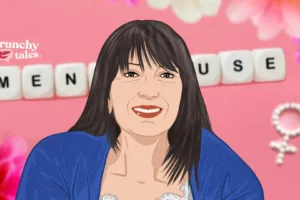Avivah Wittenberg-Cox: “Never Too Late To Find Your Soul Mate”
The spectre of ageing alone is the ultimate fear for many ladies. The attitude and assumptions we bring to the idea of being single for the rest of our lives hugely affect our ability to explore new love at our age. However, according to research by Avivah Wittenberg-Cox, gender balance expert, TEDx speaker and CEO of the global consulting firm ‘20-first‘, many women – and a minority of men – are deciding that sub-par marriages are no longer acceptable. They are driving an explosion of ‘grey’ divorce and remarriage in midlife. With children flying out of the nest and ever-longer lives stretching out ahead, mature adults are leaping, unconventionally and ambitiously, at another chance at love.
You divorced and remarried in midlife, defying the dominant mantra of books, counsellors and media who say that ‘staying together’ is the superior, more admirable choice. In fact, in your book, Late love, you argue quite the contrary. Why?
At midlife, many women finally become who they truly are. After digesting the lessons learned in the first half of our lives and a lifetime of serving and thinking of others, we wake up and realize we are not satisfied with the most important relationship in our lives, our marriages. According to my research and personal experience, great relationships are not only attainable but a natural and admirable goal for ageing humans. If your spouse is not interested in working with you to craft a deep, loving partnership, then it may be him that requires changing – and not your dreams.
As a late bloomer, close to 50, you felt you had finally become who you were meant to be. And while the world, your friends and your soul were applauding and supporting you, you had the feeling that your husband was uninterested, threatened and hiding his lack of support behind a veritable wall of seeming support. In your experience, is this a usual pattern in long-term marriages?
Naturally, there are also women who are happily married to the same person their entire lifetime. However, many couples do not work enough on their relationships; often we make more of an effort to fix problems at work than at home. It takes two partners who are both willing to invest and work on the marriage. Women seem to be more attentive and sensitive to these issues than men, or at least more interested in addressing them directly.
Many of the women you interviewed for your book felt there was a power imbalance in their early relationships, ranging from being expected to serve earlier on, to feeling unsupported as their own external power began to increase with age. How can women improve the situation?
It is crucial to discuss family roles and talk about individual expectations, goals and aspirations before getting married – and every year thereafter. Each spouse will have different, and differently evolving, dreams, wants and needs for their professional and private paths, and if the relationship is based on assumptions rather than reality, it is not going to work out. Women are often expected to be the primary carers of children, but later in life, their careers may take off. Some men are not ready to deal with this, nor to support and celebrate the late flourishing of their spouses.
You have also witnessed women getting stuck in a caring role and losing the option of being cared for themselves. Our strength threatens men and eliminates our option to be vulnerable while on the other hand our weakness isn’t recognised. How can we avoid this phenomenon?
Role fatigue is something I see a lot in my coaching. We tend to fall into certain roles early on in a couple and it is very hard to get out of them later on. That is why it would be important for women – even the ‘power women’ who like to be in charge – to ask for help early on and share the workload, especially at home. The tendency among many power women is to take charge – of everything, all the time. And resent it when it all gets too much. Perfectionism overrides vulnerability and sharing and listening.
You say we lose the complementarity of our differences when we all try to behave the same—at home or at work. The reality is, couples that celebrate and embrace their differences—and use them across all areas of their lives—may be better off. How can we appreciate our gender differences and find the right balance?
Male and female energies are different and complementary in so many ways and the sum of the two makes for a perfectly balanced life. But stereotypes and societal expectations often get in the way. Same-sex couples have more freedom to organise their roles according to skills and preferences. The happiest and most at ease couples I have met are those who’ve had very different and complementary career tracks. They leverage different skills, interests and especially timelines to consciously craft a family life and a family career that encompasses two individual careers. As I listen to these late love couples establish themselves as long-term committed pairs, complementarity and recognition of differences seem to be the common denominator. The ability to plan and manage each life and career phase to ensure that our parallel journeys can be experienced as mutually satisfying and enriching would help minimise the unhelpful impression that power balances are flipping upside down. Partners in these couples are attuned to each other’s aspirations. Fundamentally, they are there to help each other grow.
You fully embrace Margaret Mead’s vision of three key men in a woman’s life. Can you shortly explain her theory and how it applies to your own life?
Number one is your first, with whom you discover love. The second is the man you marry, with whom you spend your ‘first adulthood years’, building a family and two careers. When the children leave the nest, some women will start wondering whether their current partner is the one with whom they want to grow old. That is when the third man, the mature love, often steps into the picture. Some women, including myself, find their soul mates in this later relationship. For others, they will find all these partners in a single person.
According to your research, the trend towards second-time-round marriage must be viewed in the context of an unprecedented, millennial shift in gender relations. What do you see as the main causes leading to this shift?
As women’s educational, social and economic empowerment increases, they continue to demand more from the world, both at work and at home. They are becoming more independent, especially financially, and no longer have to settle for non-fulfilling relationships, as they have been forced to do for centuries. This is shocking to some men as they are not used to getting dumped or left behind. Women are flipping the traditional script.
In one of your Tedx talks, you mention that one of the most important career decisions we make in choosing our life partner. Can you explain why?
In order for both spouses to be able to develop and sustain a successful career, the relationship must be based on mutual support and respect. Each one has to lean in when necessary and be willing to make space for the other, even sacrifice something of their own from time to time. Marty Ginsburg (US Supreme Court Justice RBG’s husband) was the perfect example of an exceptionally supportive husband, who was proud of his wife’s career and success. She credits him with getting her seat on the Court. They had a truly gender-balanced marriage.
You write that in spite of the deep-seated craving for love most of us have, almost everything else is considered to be more important: success, prestige, money, power. Yet Erich Fromm in his famous The Art of Loving makes a case that you can become masterful at love, in the same way, that you become masterful at anything: by making it your life’s work. How does one shift their life goal from success or power to love?
My hypothesis is that we can achieve mastery in intimate relationships through self-awareness, hard work and intention: if we are willing to make love a priority and consciously redesign our relationships. According to Northwestern University psychologist Eli Finkel, personal growth marriages are unions where both partners are ambitious about self-fulfilment and see their relationship as an essential part of self-growth. Partners in these couples are attuned to each other’s aspirations and there to help each other grow. And it’s not a selfish focus. They know their impact on the world will be greater if their talents are nurtured and encouraged at home. They’re right.
You stress the importance of communication in a relationship. How can couples address the issue of lacking or unsatisfactory communication?
Communicating successfully is far more difficult than we think: often our message gets misinterpreted. It is not about what you say, but about how you are heard. The earlier in the relationship you are aware of this, the better you are off. The fundamental dissonance that too many couples bump into, beautifully summarised by Terry Real, is that women don’t feel heard and men don’t feel appreciated. A way of addressing this is to ensure that both have a safe, regular place to communicate.
You believe that one secret to good relationships is in the power of rituals. What are some of the rituals you practise and how does your marriage benefit from them?
Rituals help us stay grounded, actively exercise gratitude and connect with our spouse regularly. My husband and I start our day by having a calm breakfast – coffee and toast – together, before heading to the rush of the day. Another daily ritual of ours is listing three simple things we are grateful for every evening before going to sleep. We also have a monthly appointment – our safe place to communicate – dedicated solely to talking and listening. We follow a precise script where each of us, in turn, recounts the experiences of the past weeks, including any issues, problems or requests that may have come up. The other listens intently, without speaking or reacting – and then summarizes what they heard. This allows us to discuss everything constructively and lovingly, without being defensive. It has strengthened our relationship enormously and we both look forward to the moment. Really!
You write that the best ingredient for finding happiness in late love is to find yourself first. You also state that the only person you can change is yourself. Therefore, the most important relationship we have is with ourselves?
We tend to think that the problems we have with our spouse are caused by them, not us. However, happy marriage takes two partners who are both willing to grow, learn, change and resolve problems together. We cannot change our spouses, but can always work on our own flaws. To be able to love another person profoundly, we first need to love, know and accept ourselves. In my leadership coaching, I am regularly astonished by how little people know about themselves, where they are headed and what their impact on others is. As Socrates said, “An unexamined life is a life not worth living”. We should start any examination of our couples by learning about ourselves.
Like this article? Sign up to our newsletter to get more articles like this delivered straight to your inbox.





